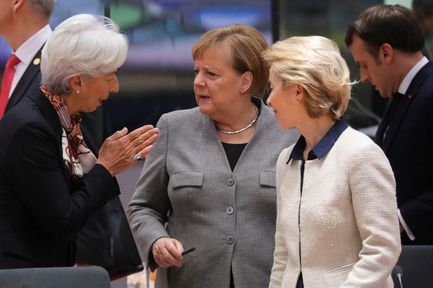Der Spiegel on two women and Europe:
'"Merkel must now finish baking the half-baked biscuits," says Mario Monti, who was Italian prime minister during the 2011 euro crisis. He says he has no doubt that she will succeed. "Germany has just shown, with excellent authority, that it has a great leadership strength." He says the way Berlin is providing Europe with its own financial resources is "unique."
Even Poland is looking favorably upon the German presidency of the Council. Germany has had a bad reputation among members of the Polish right-wing, who currently govern the country and who have argued that Berlin has never given up its quest for world power.
But despite its occasional ideological stubbornness, Warsaw is currently acting pragmatically: Since the British left the EU, Polish national-conservative politicians lack a role model and partner in the EU. That leaves them only the Germans, which is why the Polish government fraction secured a majority for Ursula von der Leyen in the EU parliament.
In Germany, little resistance to a pro-European policy is to be expected, except from the right-wing populist Alternative for Germany (AfD), which was founded as an anti-euro party. The CDU and CSU, on the other hand, will support the chancellor. "The appetite for rebellion has been curbed," says Gunther Krichbaum, the chairman of the Europe committee in the German parliament. "The situation is allowing Angela Merkel to do things that would not have been possible before." By situation, he means Merkel's good poll results and the COVID-19 shock.
Florian Hahn, European policy spokesperson for the CDU/CSU parliamentary group, sees things similarly. "It is no longer the time for cheap reflexes," he says. "Corona has the potential to destroy Europe." He claims that this is now clear to many people in the party. Hahn is not only a politician focused on Europe, he is also the deputy secretary general of the CSU and one of the closest confidants of party leader Markus Söder. "For us, there is definitely a learning curve when it comes to Europe."
Daniel Caspary, the chairman of the CDU/CSU members in the European Parliament, argues that, given China's rise and the developments in the U.S., it is even more crucial, from the party's point of view, to strengthen the EU. "To this end, Merkel will have broad support in the CDU and CSU during the German presidency of the Council," he says.
With so much support, Merkel could even afford to risk a bit of visionary ambition. She could also just start marching. A recent statement by Merkel, for instance, was surprising. She said that one needs to talk seriously about what Europe cannot do well enough. "This can include treaty changes; it can include us moving much closer together."
Above all else, Merkel is thinking about foreign policy. She often emphasizes how important it is for Europe to present a united front if the EU is not to be squeezed between the U.S. and China. A first step would be to stop the practice of having every foreign policy announcement coordinated with every EU member.
The chaotic reaction to COVID-19 has also made Merkel consider a closer union. In a joint letter with Macron and other national leaders to von der Leyen, she argued that the last few weeks have "raised questions about the EU's preparedness for pandemics" and highlighted the need for a "Europe-wide" approach.
A Chancellor Merkel who changes treaties and no longer views EU policy from a purely German perspective -- that would really be something new.'
Read the article here.
Despite the rather shortsighted Dutch resistance to the Merkel and Macron plan something good might come out of this crisis. At least the realization by some of the major players that 19th century nationalism in Europe means being squeezed out of money and power by the major players, China, US and Russia to a certain extent.
